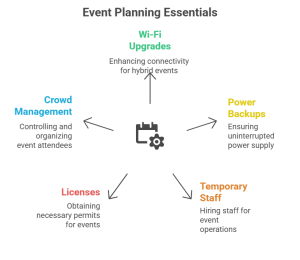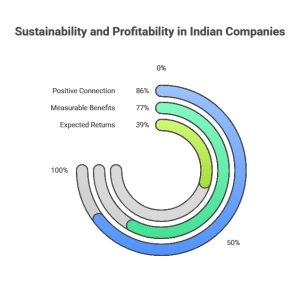What is the blog about?
This blog explores the most common corporate event budgeting mistakes for 2025. It offers a practical lens on how to approach event spend—while avoiding cost overruns and poor ROI. These event budget challenges are based on real-world experience and industry best practices.
Who should read it?
B2B event managers, corporate marketing teams, procurement leaders, and business decision-makers involved in corporate event planning, internal town halls, MICE events, expos, brand activations, and executive summits—especially those managing budgets and/or learning how to create an event budget in India.
Why is it important?
In 2025, both international and Indian corporate event planners are facing a new set of event budget challenges: rising vendor costs, hybrid event complexities, ESG, compliance, and the growing expectation of measurable returns.
What can you do with it?
With everything we’ve covered, you now have a clearer path to envision events that actually support your business goals—not just look good on the surface.
From 27+ years of being a consistent corporate event management company in India, & after managing 1000+ events for Top IT Giants, we can say,
One of the biggest corporate event budgeting mistakes is assuming that it is just about numbers, whereas, it’s about expectations, brand perception, internal approvals, and, most importantly, measuring event ROI without last-minute panic.
After organizing events for leading IT firms in India for over two decades, we’ve seen how even the best-laid plans can derail—just because a few numbers didn’t add up or a vendor went MIA. Assuming that budgeting for corporate events is just about numbers- considering it is a huge a mistake.
Avoiding Budget Pitfalls: Common Budgeting Mistakes To Watch Out For:
-
Targeting The Right Audience
Getting the right audience is an expensive proposition. A successful event only takes shape when the right audience is present at the right event. Knowing who the event is for is the first set of things to get right.
Every rupee spent must align with the expectations and mindset of your actual attendees—whether they’re CXOs, tech leads, HR heads, or strategic clients. Get the audience right, and half your job is already done. For instance, in a hall of 100 people, an organzier wouldn’t want even 1 of them to not be a business prospect. High attendee quality matters more than quantity.
-
Underestimating The Venue & Timing Impact
Timing and location matter more than one can imagine. They single-handedly anchor the event in the right direction. In corporate events, convenience shouldn’t be a factor that drives the venue or date decisions—context should. Especially in India, where traffic, weather, and work culture varies by city, the wrong time and place can crush a turnout.
Imagine trying to host a Friday evening event on Bengaluru’s Outer Ring Road during monsoon season. It sounds ambitious—but may end in half-empty chairs and stressed-out guests. On the flip side, imagine a client who booked a Wednesday evening slot when vendors are more available, the venue is more affordable, and most importantly senior management folks are willing to give time to an event.
For a B2B event, you know big of a deal this is. Additionally, there remains no competing events in the city. All combined, it becomes a smooth sailing, and the attendance proves it. This can be achieved only the venue and timing are aligned to the reality of the market.
-
Overlooking Hidden Costs
One of the most common corporate event budgeting mistakes is overlooking the hidden yet unavoidable costs that slide in during execution. Sometimes, focusing only on the fixed costs—be it, venue, branding, AV, speakers—might seem sufficient at first glance. But in reality, it’s the unseen, unplanned expenses that may quietly begin to derail the event last minute.

It often happens that event planners might overlook essentials like:
- Wi-Fi upgrades for hybrid or high-bandwidth sessions
- Reliable power backups (yes, even 5-star venues can lose end!)
- Temporary staff for registration desks, badge printing kiosks, crowd control, or valet parking
- Licenses required for liquor arrangements (varies by every city), performing arts, etc.
- Crowd management, this one can cost an event. An adequate arrangement is what that helps save the unprecedented last minute increase
These aren’t luxuries—they’re necessities. The absence of any one can break attendee experience and damage your brand’s credibility or sometimes get the organizer in what we call a legal trouble. Hoping that never happens, if you already check the boxes beforehand.
A smart rule of thumb? Try to allocate a 10–15% contingency buffer for these inevitable “invisible” costs. Because in event planning, it’s often the small things that create the biggest disruptions—good or bad.
-
Lack of Contingency Planning
Yet another one of the highly overlooked corporate event budgeting mistakes is failing to plan for contingencies—because unexpected disruptions are inevitable. What if — things go wrong, speaker miss their flight, rain floods the outdoor setup in Chennai or a vendor cancels a day before. What saves the day is not a makeshift—it’s a contingency fund. For marketers, budgets are always tight, however, knowing when to save/spend, is a skill that becomes crucial during event planning.
We recommend setting aside at least 10% of the budget for unplanned expenses. Picture a SaaS team in Bengaluru, scrambling behind the scenes as their keynote speaker was grounded in Singapore. With no time to spare, they tapped into their emergency buffer, spun up a virtual setup, and pulled it off so smoothly the audience never guessed a thing. But the team? They knew they’d just swerved a disaster.
-
Misaligning Event Success Metrics
One of the most common budgeting mistakes in corporate event planning is focusing all resources on the event experience itself, while neglecting the critical touch points that come before and after.
A successful B2B event isn’t measured only by attendance or how smoothly the day ran—it’s defined by the outcomes it drives. That includes pipeline growth, qualified leads, and long-term engagement. And to achieve those, your budget must account for post-event marketing efforts just as much for pre-event visibility.

More often than not, B2B firms may spend 90% of the budget on logistics, décor, and production, leaving little room for:
- Pre-event awareness campaigns (email drips, retargeting ads, thought-leadership content)
- Post-event follow-up, including thank-you notes, highlight videos, survey collection, lead nurturing sequences, and ABM retargeting
Neglecting the above-mentioned efforts is again one of the common corporate event budgeting mistakes that directly influence conversion rates and long-term ROI. Set aside at least 10–15% of your total budget for post-marketing activities. Because an event’s true value unfolds long after the applause fades.
-
Measuring Event ROI
Now comes another crucial aspect. Allocating a budget is only half the job—measuring event ROI on investment is just as important, yet often overlooked in haste.
To truly understand whether your event delivered value, building in ROI metrics early on is the way to go. Ask questions like:
- How many qualified leads did we generate?
- What was our cost per engagement or per attendee?
- Did we receive rebooking interest, media mentions, or social media reach?
- How much pipeline revenue was influenced or accelerated post-event?
- How many sales meetings or demos were booked on-site?
Measuring these indicators not only justifies your spending but also gives you the data to optimize future events. Without a system in place to evaluate success, even the well-executed event may risk becoming a missed opportunity for growth.
-
Ignoring Compliance Needs
Corporate event budgeting sometimes may overlook mandatory local regulations that can create more than just logistical hiccups—it may land an event in serious legal trouble. From F&B licenses and fire safety NOCs to police permissions and crowd control norms, even small internal gatherings in India are subject to strict scrutiny.
Outdoor venues, in particular, often come with their own layers of municipal approvals. Non-compliance isn’t just risky—it can result in event delays, cancellations, or brand embarrassment. Doing prior checks and paperwork always comes in handy, even better, consulting a local legal expert or hiring a corporate event management company in India to ensure you’re covered on all fronts is the most sought after solution.
-
Incorporating Sustainable Practices
In India’s evolving corporate landscape, sustainability is no longer a buzzword—it’s a business imperative, especially when catering to global clients, MNCs, or ESG-conscious stakeholders. While local regulations may not always mandate it, the expectation for eco-responsibility is rising fast.

- 86% of Indian companies see a positive connection between sustainability and profitability, with 77% already reporting measurable operational benefits—and 39% expect returns within five years. (source: SAP News Center)
- 55% of Indian C‑suite leaders say they are embedding sustainability initiatives, though only 66% have formal ESG targets and 61% conduct internal sustainability training. (source: Economist Impact)
Incorporating elements like digital invites over printed cards, biodegradable décor, zero single-use plastic zones, and waste segregation stations is not just good optics—it reflects operational maturity. Venues powered by renewable energy or those offering water-saving infrastructure can further boost an event’s sustainability score.
Planning a carbon-neutral or net-zero emission event may still be niche in India, but its gaining traction—particularly in metro cities. These efforts go beyond compliance; they speak to inclusivity, innovation, and future-readiness. Proactively addressing sustainability in your budget and planning process helps ensure stronger brand credibility.
-
Using a One-Size-Fits-All Framework
What works in one geography may not prove to be equally efficient in another. We’ve seen firms try to copy-paste budget templates from their US teams or previous years and vice-versa, thinking it’ll save time.
But Indian event landscape is different—vendor reliability, payment terms, pricing, audience expectations, and logistics all vary. You need a tool/method and an execution partner that understands this ecosystem.
That’s exactly why we built a budgeting tool for Indian corporate events. For 2025 and beyond, this kind of contextual approach is the edge events need. It is specifically built for Indian corporate events keeping in mind all the necessary requirements.
After almost 3 decades of experience in the industry, we have noted a few things—all events, big or small require a specialized attention. No one-size-fit all works to create a desired outcome.
Conclusion
Event is a one-time opportunity, and we say this with all responsibility. You can simply prepare best, and see it being executed till the last minute. This is where an experienced partner joins in.
In-house teams may seem like an answer to your firm’s event needs, but think of it this way: it’s always smarter to invest in getting it right the first time than to fix what went wrong, thus hiring a specialized corporate event management company in India ensures smooth execution.
Therefore, if you’re planning an event with hybrid capabilities, offsite, town hall meets, exhibitor stalls, and training programs—you need:
- An integrated budgeting tool suitable to Indian event needs
- And a seasoned corporate event partner
Our event management team has worked with numerous Indian IT firms with over 9000+ successful projects delivered for including NVIDIA, HP, SAP, Red Hat, HT, Lenovo, Redington, among others. As you plan your next big event in 2025, let us help you do it right—with the 1st ever Indian Corporate Event Budget Calculator specific for Indian cost estimates.
Ready to take the stress out of your Corporate Event Management? Let’s talk—we’re here to turn your budgets into business wins.
FAQs
Why are event budgets harder to manage now?
Costs are rising, hybrid events are complex, and ROI matters more than ever.
What’s the biggest mistake in corporate event budgeting?
Not using a planning tool tailored to Indian vendors, costs, and logistics.
How can I avoid surprise expenses?
Use a budgeting tool that factors in hidden costs like staffing, licenses, and tech.
What’s the right contingency buffer to keep?
We recommend a 10–15% buffer—our tool includes this by default.





